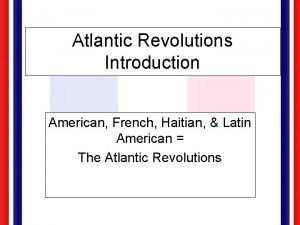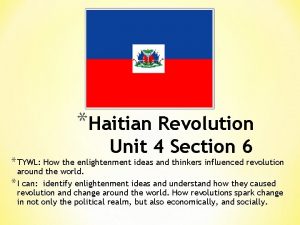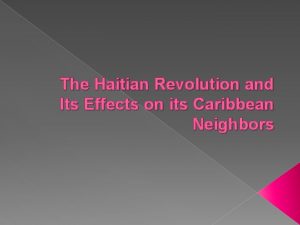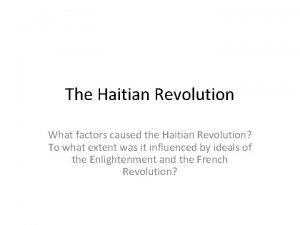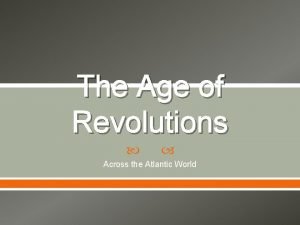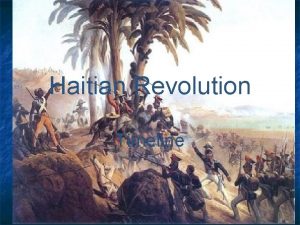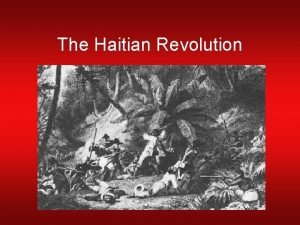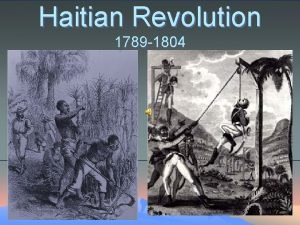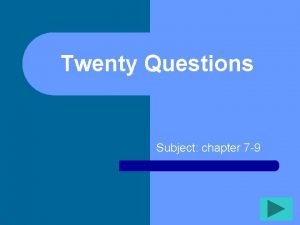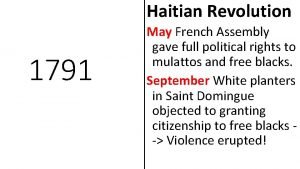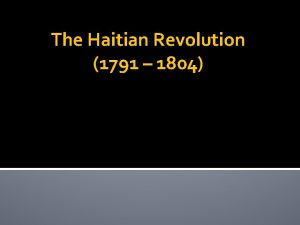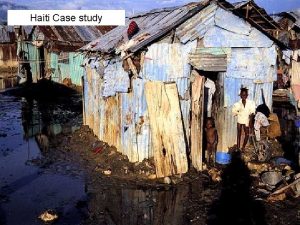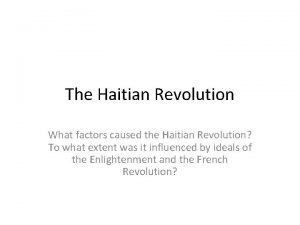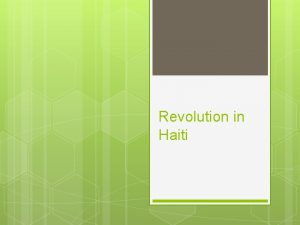I The Haitian Revolution A Revolution in Haiti











- Slides: 11

I. The Haitian Revolution

A. Revolution in Haiti 1. only successful slave revolt 2. on the Island of Hispaniola – – Spanish colony Santo Domingo in east French colony of Saint-Domingue in west 3. wealthy colony – sugar, coffee, cotton 2

HISPANIOLA

B. Society in Saint-Domingue 1790: – 40, 000 white French settlers – 30, 000 gens de couleur (mixed-race, freed) – 500, 000 black slaves (many flee to mountains as “maroons”) Did the Declaration of Rights of Man apply to male slaves?

C. The Revolt 1. inspired by American & French revolutions – 500 gens de couleur sent to fight British in America 2. in 1789 white settlers demand self-rule… 1791 civil war 3. slaves revolt under Boukman (a Vodou priest) August 14 th, 1791

D. François-Dominique Toussaint (1744 -1803) 1. freed slave…renames self Louverture (“the opening”) 2. slave revolt leader in 1791… 1801 named Governor for Life 3. 1801: constitution of equality and freed slaves in Santo Domingo

4. 1802 arrested by Napoleon’s forces, died in jail 5. 1804: independence from France & renamed Haiti (1 st black republic) “In overthrowing me, you have done no more than cut down the trunk of the tree of the black liberty in St. Domingue- it will spring back from the roots, for they are numerous and deep. ” - Toussaint L’Ouverture

II. Emergence of Ideologies 1. Conservativism – anti-revolutionary change – Edmund Burke (England, 1729 -1797) 2. Liberalism – anti-status quo – manage social change – John Stuart Mill (England, 1806 -1873)

A. Nations & Nationalism 1. nation: cultural unit based on shared language, customs, values, history 2. “nation” influences political boundaries 3. Types of nationalism: --cultural (Volksgeist: spirit of the people) --political (“unification”) 9

Europe after the Congress of Vienna

B. National Rebellions 1. Greek independence from Ottoman Turks (1830) 2. “Social” Rebellions of 1848 Causes: – conservative rule – nationalism – socioeconomic problems from Industrial Revolution – “hungry forties”…bad harvests (Irish Potato Famine) – rebels take Vienna; Metternich resigns & flees (“France sneezes & Europe catches a cold…)
 Cause of haitian revolution
Cause of haitian revolution Causes of the haitian revolution
Causes of the haitian revolution Tywl
Tywl Haitian revolution effects
Haitian revolution effects What factors caused the haitian revolution
What factors caused the haitian revolution Haitian revolution causes
Haitian revolution causes Haitian revolution timeline
Haitian revolution timeline Haitian
Haitian Haitian revolution map
Haitian revolution map Dutty boukman organizes slave revolution
Dutty boukman organizes slave revolution Haitian creole is an example of patois because
Haitian creole is an example of patois because Cécile fatiman
Cécile fatiman

